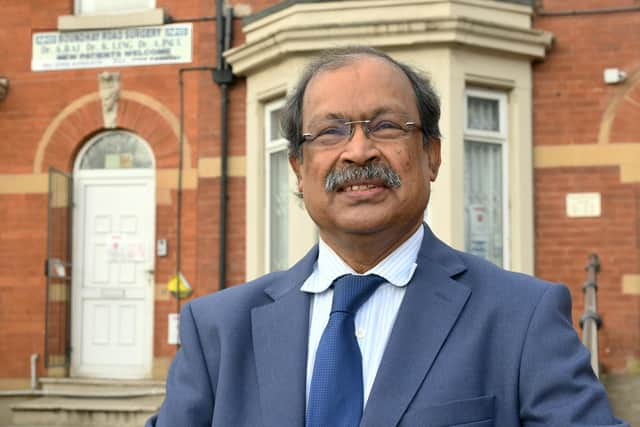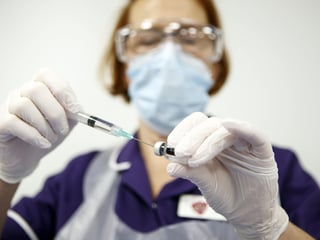Covid vaccination process and side effects explained by Leeds GP surgery staff who have had jabs
and live on Freeview channel 276
As frontline health workers, the team at Roundhay Road Surgery in Harehills are within the four priority groups that the Government wants to vaccinate by mid-February.
They were each offered the chance to receive their first dose of the Pfizer/BioNTech vaccine in mid December before a second dose on January 6 - four days before updated guidance came into effect in West Yorkshire that means second doses will be given within three months rather than the previous three weeks.
Advertisement
Hide AdAdvertisement
Hide Ad

The move is intended to ensure that more people in the priority groups receive their first dose and get an initial level of immunity to Covid-19 as soon as possible.
Dr Amal Paul, who works at the practice, received his jabs at East Park Medical Centre - one of 17 vaccination sites now open across the city, with a large vaccination centre at Elland Road expected to open in the coming weeks.
He said: "I had no side effects, just a little pain at the site of the vaccination. It was an excellent experience.
"Although initially there was some apprehension with a new vaccine, things like that, it was just like having a flu jab. It's nothing out of the ordinary to be honest.
Advertisement
Hide AdAdvertisement
Hide Ad"My message would be the vaccine is safe, effective and very simple. So far our experience of the vaccine is similar side effects to others like pain at the site of the injection.
"If you have an invitation from your GP, please consider strongly getting the vaccine. It's to protect you, the community and the whole country, to break the cycle of coronavirus infection."
The vaccination roll-out began in Leeds on December 8, the same day that Margaret Keenan - then 90 - became the first UK recipient of the Pfizer/BioNTech jab.
Almost 18,000 people in the city had received their first dose by Christmas and that figure now stands at more than 40,000 - around five per cent of the total population of Leeds.
Advertisement
Hide AdAdvertisement
Hide AdPractice nurse Karen Womersley said she had been following news about the efforts to create a vaccine closely, partly because of her job but also because of the prospect it offers for life returning to normal in time.
"I was a bit nervous about having it but it was good to have it done," she said. "The set-up was great. It's very well organised I thought.
"Once I found it and went it, I was welcomed in and told I was in the right place. It was explained to me at every stage as we went through and where to stand."
Masks are worn throughout the process, with the social distancing and hand sanitising too that is now so familiar to everyone.
Advertisement
Hide AdAdvertisement
Hide Ad"You're given a consent form to sign and somebody goes through that with you," Mrs Womersley said. "You have to wait for your turn then somebody comes and calls you over.
"You're asked if you're allergic to anything or have had any reactions before. You're asked what arm you want it in too."
After a 15-minute observation period, vaccine recipients are then free to return home.
Also in news: The different Covid vaccines explained - and why you can't choose which one you receive
Advertisement
Hide AdAdvertisement
Hide AdLike many people, medical secretary Rhadika Bhugal had seen people posting in WhatsApp groups about the vaccine and this had been at the back of her mind as she waited to see when her turn would come.
She said: "Dr Paul and the medical staff are more educated on it than me. When I saw they were having it, I thought I should too. It's given me that confidence that I would get the vaccination.
"When I got there, there was quite a long queue. People were quite excited to be having, lots of people aged 80 plus.
"The staff were really good if people needed any interpretation. You stand in the queue, get your sanitiser and sign your consent form with your details, where you're registered and so on. Then you have the injection.
Advertisement
Hide AdAdvertisement
Hide Ad"They asked us to stay in a room for observation for 15 to 20 minutes and that's it. It's done like that."
While worries surrounding vaccination for some people come from a fear of needles, for others the possibility of side effects is the focus.
Mrs Bhughal said: "I have a flu jab every year. With the Covid jab, I had a headache just the first day and took some paracetamol. I had pain in my arm for a couple of days and after that it was fine."
She said she was encouraging family members to accept the offer of a jab when their turn came, adding: "Everybody should have it. It's for protection for themselves and others as well. It's the way we can get out of this situation."
Advertisement
Hide AdAdvertisement
Hide AdBoth Mrs Bhughal and Mrs Womersley said the side effects in the days immediately after they had their jabs were more pronounced with their second dose.
For Mrs Womersley, it meant flu-like symptoms that resulted in her needing a few days off work to rest up.
"It was just the side effects of the vaccine, I know that," she said. "I just took paracetamol and Lemsip helped me, and I slept a bit more.
"I still think it's much better to have the vaccine than not. When you see how the world is at the moment, you feel there's some light at the end of the tunnel."
Advertisement
Hide AdAdvertisement
Hide AdShe added that friends and family have had lots of questions for her after learning she had received her jabs.
"They just want to know how you're feeling, did you have any reactions," she said. "On the whole, most people people I know want to have it which is good."
Also in news: Rollout of Covid vaccines to local pharmacies would clear up confusion for communities desperate to get the jab
The Government has set the target for a vaccination centre to be less than 10 miles away from every resident in the UK.
Advertisement
Hide AdAdvertisement
Hide AdBut the Yorkshire Evening Post has teamed up with sister titles across the country to urge Prime Minister Boris Johnson to go one step further - to deploy the country’s network of 11,000 pharmacies to ensure that every citizen is only a short walk away from a centre.
Our campaign also requests further reassurance for local communities from the Government and more easy-to-access information on the vaccine programme and its progress.
Backing those calls for more pharmacies to be involved, Dr Paul said: "It would be a very positive move. Another would be to allow the GP practices to vaccinate their own patients like with the flu jab.
"It's not a competition. We don't compete, we compliment. If they took on that role, it would be particularly positive in my mind."
Advertisement
Hide AdAdvertisement
Hide AdWhile the focus on creating dedicated vaccination centres was understandable given the cold storage requirements for the Pfizer/BioNTech vaccine, the additional approval of the Oxford/AstraZeneca jab - which can be stored in a normal fridge - removes many of the earlier hurdles around distribution.
Dr Paul added: "There's no reason why reason why individual practices can't vaccinate their own patients."
Support the YEP and become a subscriber today. Enjoy unlimited access to local news and the latest on Leeds United. With a digital subscription, you see fewer ads, enjoy faster load times, and get access to exclusive newsletters and content. Click here to subscribe.
